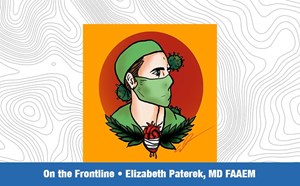Artists Among Us: ACEP's 2021 Annual Report features original art submitted to the 2020 and 2021 HeART of Emergency Medicine Galleries. This piece, “The Pull of Rotations" by medical student Sara Twadell, depicts the inner "tug of war" battle in her head that occurs as she tries to discover which medical career path to take. Medium: Procreate on iPad
Surprise Billing Implementation Surprises Everyone
We thought the end of 2020 brought the end of our battle over out-of-network billing, through Congressional passage of the No Surprises Act. We considered it a solid win that this comprehensive bill to bans balance billing for out-of-network (OON) was coupled with a fair process independent dispute resolution (IDR) to ensure that clinicians and facilities are paid appropriately for the OON services they deliver.
ACEP was able to secure strong language in the first interim final rule implementing the No Surprises Act that enforces the prudent layperson standard. The rule states that denying emergency coverage based on a retroactive review of diagnosis codes is inconsistent with the emergency services requirements of the No Surprises Act and the Affordable Care Act. As part of the rationale for the policy, the rule specifically refers to ACEP’s lawsuit against Blue Cross & Blue Shield of Georgia.
Unfortunately, everyone was surprised (in a bad way) by the second IFR for this bill. The IFR undid key components of the law’s IDR provisions and goes against congressional intent of the No Surprises Act. ACEP and many others worked hard with Congress to ensure a final bill that protects patients from surprise bills while providing a robust independent dispute resolution (IDR) process. The purpose of IDR is to facilitate a fair interaction between parties once patients are out of the middle of billing disputes.
However, what this second IFR puts forth is the total opposite. By requiring arbiters to greatly prioritize the artificially low Qualified Payment Amount (QPA) set by insurance companies, the new rule as written undermines the entire IDR process and could encourage insurance companies to narrow their networks even further, making it harder for patients to get emergency care, particularly in small or rural communities.
We’re fighting back:
Oct. 1: ACEP issues a statement strongly and publicly voicing our disappointment that the regulations almost entirely inconsistent with Congressional intent to create a fair and unbiased process to resolve billing disputes..
Dec. 9, 2021: ACEP supports the goals of the lawsuit filed by the American Medical Association and the American Hospital Association against the Departments of Labor, Treasury, and Health and Human Services.
Dec. 22, 2021: ACEP files its own legal action against the federal government’s implementation of the No Surprises Act, joining with the American College of Radiology and the American Society of Anesthesiologists to file a lawsuit charging that the interim final rule (IFR) on surprise medical billing goes against the language of the No Surprises Act and will ultimately harm patients and access to care.
Feb. 23, 2022: A federal judge in Texas ruled that the No Surprises Act implementation fails to follow the letter of the law, and that giving unequal weight to the Qualified Payment Amount (QPA) tilts the process unreasonably in favor of insurance companies. The court also determined that by skipping a customary notice and comment period while the law was being finalized, the government failed to follow its own well-established and transparent regulatory process. The concerns validated by the ruling in Texas are some of those shared by ACEP’s lawsuit as detailed in this article. The legal action is far from over; ACEP’s lawsuit is one of five other pending cases on this topic.
After the Texas ruling, a statement was issued by the Centers for Medicare & Medicaid Services (CMS) and the Department of Labor clarifying that the Texas court order did NOT affect the important patient protections embedded in the No Surprises Act, specifically the ban on balance billing. This is critical because some stakeholders, especially the insurance industry, have been falsely stating that the court order would in fact invalidate the patient protections by halting the implementation of the law. For a detailed breakdown of how the Texas ruling has affected implementation of the No Surprises Act – and what to expect next – visit ACEP’s regulatory blog.
The fight continues, and we need your voices to present a united front on this critical issue. Stay updated on all of ACEP’s advocacy efforts, surprise billing and more, by joining the 911 Grassroots Network.
Surprise billing advocacy happens on the state level, too. As of Dec. 20, 2021, 19 states had introduced 37 bills related to out-of-network billing. ACEP’s state legislative staff and ED Practice Management Association work directly with ACEP chapters year-round to support state-level advocacy on all issues. Learn more.
ACEP vs. UnitedHealthcare
What can we do when our members push back against a dangerous policy with unified, shared outrage? Let’s consider what happened when we battled UnitedHealthcare:
UnitedHealthcare (UHC) enacted a policy to retroactively deny patients' emergency care claims – a clear violation the federal prudent layperson standard. Immediately, ACEP responded with a strongly worded statement and impactful social media pressure which resulted in major stories in The New York Times and USA Today. Our Twitter post promoting our statement became our most successful post ever with over 1.5 million impressions and 34,000 engagements, attracting attention and interest from lawmakers, and health leaders.
In just six days, UHC reversed course and delayed the policy. Once UHC delayed the policy, ACEP drafted a letter to UHC that 32 organizations signed onto calling on the insurer to permanently abandon it.
This situation with UHC reminds us that we can have patient advocates on our side. We can help them understand, in their own words, how to help protect their right to seek care and get evaluated by an emergency physician.
Our Annual Trek Up Medicare Mountain
Every year, when the Centers for Medicare and Medicaid Services releases its proposed Physician Fee Schedule, ACEP’s reimbursement team springs into action. ACEP is the only voice for emergency medicine on the AMA’s Relative Value Scale Update Committee (RUC) that helps CMS determines the value of specific codes, so we are able to argue the case of all EM physicians.
Our specialty was facing significant reimbursement cuts based on the proposed PFS released in July 2021. So ACEP did what we do best: We rallied our members to the cause. Medicare reimbursement cuts were a main topic during ACEP’s Leadership and Advocacy Conference in July, and we did an all-member grassroots campaign to put pressure on Congress.
Your efforts paid off: More than half of the members of the House of Representatives (247 in total) joined a bipartisan "Dear Colleague" letter urging Congressional leaders to provide stability for health care clinicians by addressing the looming payment cuts. That letter helped push Congress over the finish line, and they passed a one-year fix averting the majority of the proposed cuts.
ACEP’s Medicare reimbursement advocacy is impossible to explain in the space allotted here, so we encourage you to read this deeper dive on our regulatory blog for the full story and what’s coming next.
New for 2022: Field Testing the First EM-Specific Cost Measure
One reimbursement problem our specialty has faced is the dearth of available cost measures in the Merit-based Incentive Payment System (MIPS) and other quality reporting programs that are applicable to EM physicians. CMS and Acumen convened an expert panel to develop a cost measure that could be directly attributable to our specialty, with ACEP members serving on the panel.
Using the insights from the panel, Acumen then constructed a draft emergency medicine cost measure that incorporates elements of ACEP’s alternative payment model, the Acute Unscheduled Care Model. This draft measure is being field-tested in early 2022, and the expert panel will work with Acumen to develop the final measure based upon the feedback. Read more.
Stay Updated
Reimbursement and its regulations may not be easy topics, but they are critically important for the health and future of emergency medicine. The highlights on this page only scratch the surface of the year-round work being done to protect EM physicians. Check out these additional resources to stay current on EM reimbursement:





